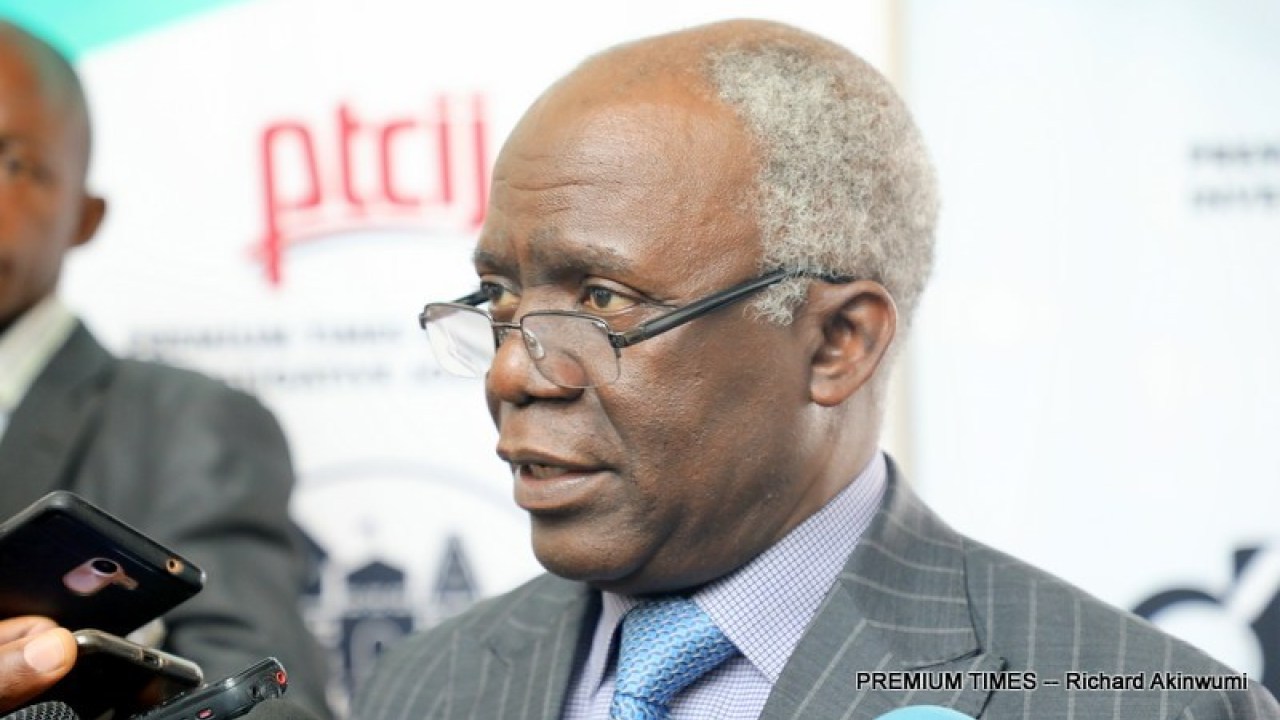Femi Falana, an activist lawyer, has on Thursday, December 19, 2019, said that the Senate is legally prohibited from confirming the appointment of a deputy governor of Central Bank of Nigeria, CBN, Edward Adamu appointment as the Chairman of the Asset Management Corporation of Nigeria, AMCON, Board.
He said this was because the five-year tenure of the current occupant of the office, Muiz Banire has not expired by effluxion of time.
Falana argued that if the Senate proceeds to confirm the appointment of Adamu, “all actions and decisions of the AMCON board under his chairmanship are liable to be set aside on account of the illegality of his appointment.
“Even though Dr. Banire has said that he is not bothered by his purported removal from office, the issues involved transcend his person”, he said, adding “since AMCON is battling with the recovery of not less than N5.4 trillion from members of the comprador bourgeoisie, the Senate cannot afford to ratify illegal appointments of the members of the board of AMCON”.
Falana stated this in a statement issued in Lagos on titled, “Why Senate Cannot Confirm Edward Adamu as AMCON Chairman”
According to Falana, “Muiz Banire the current chairman of the board of the AMCON was appointed in July 2018. His nomination was made by President Muhammadu Buhari and confirmed by the 8th session of the National Assembly.
“The said appointment was made pursuant to section 10(3) of the Act to the effect that “A member of the Board appointed pursuant to this section-(a) shall hold office for a term of five years;…
” Since the appointment has not expired the President has not removed Dr. Banire from office under the relevant provisions of the Asset Management Corporation of Nigeria Act, 2010.
“However, by a letter dated 10th day of December, 2019, President Muhammadu Buhari requested the Senate to confirm the nomination of Edward Adamu, a deputy governor of the Central Bank of Nigeria as the new Chairman of AMCON. The nomination is said to been made pursuant to Section 3(a) of the Asset Management Corporation of Nigeria (Amendment No. 2) Act, 2019 which has amended Section 10 of the principal Act by providing for “a part-time Chairman who shall be a Deputy Governor in the Central Bank of Nigeria to be nominated by the Central Bank of Nigeria” to head AMCON”.
But Falana contended that such provision as contained in Section 3(a) of the 2019 Amendment Act can only operate in futuro as it cannot nullify or annul an appointment made under the law before the amendment of the AMCON Act.
“In other words, since the amendment cannot operate retrospectively the appointment of Mr. Adamu cannot take effect until Dr. Banire has served his full term unless he decides to resign before the expiration of his 5-year tenure.
This submission accords with section 6 (1) (c) of the Interpretation Act which provides that the repeal of an enactment shall not “affect any right, privilege, obligation or liability accrued or incurred under the enactment.”
To support his submission the matter, Falana said the provision of the law was already given judicial endorsement in the case of Salami Afolabi & ORS. V. Governor of Oyo State & ORS. (1985) LPELR-SC.251/1984 where Oputa JSC of blessed memory held:
“Generally speaking, retrospective laws are prima facie of questionable policy and contrary to the general principle that legislation by which the conduct of mankind is to be regulated ought, when introduced, to deal with future acts, and ought not to change the character of past transactions carried on upon the faith of the then existing law – See Willes, J. in Phillips v. Eyre (1870) L.R. 6 Q.B. 89; see also Scrutton L.J. in Ward v. British Oak Insurance Co. Ltd. (1932) 1 K.B. 392 at p. 397.
“Prima facie therefore a new legislation will deal with future not past events. If it were not so, the Act might annul rights already acquired, while the presumption is against this intention.
“Coming to the policy of the court, the consensus of judicial opinion is that the courts lean against interpreting an Act or Law as to deprive a party of an accrued right. Perhaps no rule of construction is more firmly established than this, that a retrospective operation is not to be given to a statute so as to impair an existing right or obligation, otherwise than as regards a matter of procedure”, he argued.







